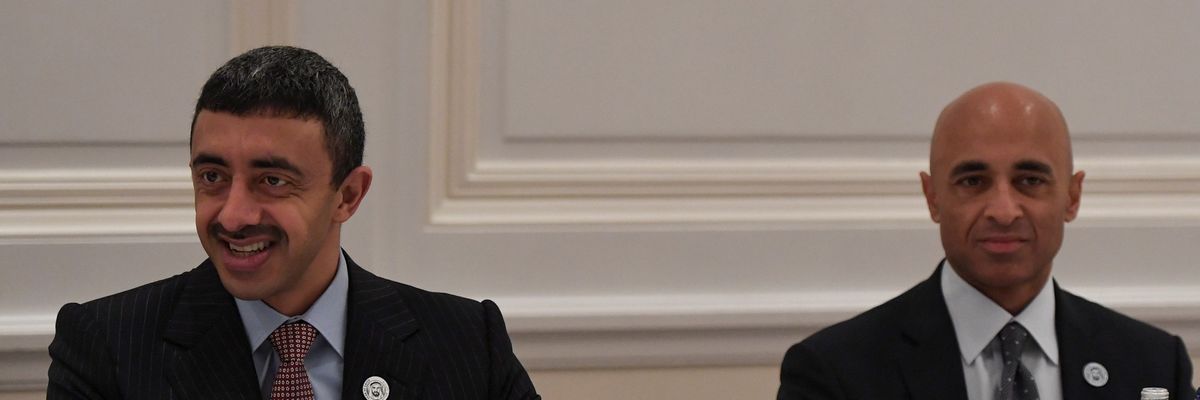In July, the head of Donald Trump’s inaugural committee and a top campaign fundraiser, Tom Barrack, was indicted for “unlawful efforts to advance the interests of the United Arab Emirates (UAE) in the United States at the direction of senior UAE officials.” The indictment made clear that this included work by Barrack and his co-defendants to directly influence foreign policy positions of the Trump administration in the UAE’s favor.
What was not clear from the indictment was who were the senior UAE officials directing this illicit influence operation. That changed on Tuesday when Bloomberg revealed that those “UAE officials” are actually the very pinnacle of the UAE government, including the UAE’s Ambassador to the United States, Yousef al Otaiba, and even the UAE’s de facto leader, Abu Dhabi Crown Prince Sheikh Mohammed Bin Zayed, or MBZ.
While its extraordinary to learn that the head of a foreign autocracy was directing an illicit influence operation, this is far from the first time the UAE has been caught illegally meddling in America.
Just two weeks ago, three former U.S. intelligence operatives admitted to working as cyber spies for the UAE, hacking into U.S. computer networks, and giving the UAE unauthorized access to “tens of millions of smartphones and mobile devices,” in the United States, according to the Justice Department. The cyber spies’ operation, known as Project Raven, also targeted journalists and human rights activists in the Middle East, some of whom were later tortured by UAE security forces.
While MBZ was directing Barrack and his co-defendants’ influence operation, he was also personally guiding another operation to gain influence in Washington. At MBZ’s direction George Nader — an adviser to MBZ and Donald Trump, who is now in prison on child pornography charges — ran what the DOJ called a “conduit campaign” to conceal the true source of more than $3.5 million in illegal campaign donations. The campaign was initially focused on gaining access and influence within the Hillary Clinton presidential campaign. But, after Trump’s victory in the 2016 election, the UAE’s focus quickly shifted to Trump, beginning with a $1 million illegal donation to his inauguration.
In addition to this illicit campaign contribution scheme, Nader also orchestrated a covert campaign, to vilify the UAE’s rival Qatar in Washington. After receiving $2.5 million from Nader, Trump fundraiser Elliott Broidy bankrolled two anti-Qatar conferences hosted by D.C. think tanks. This was just a small part of an immense push by the UAE to gain sway in Washington policy circles. In fact, no dictatorship gives more money to D.C. think tanks than the UAE — and that’s just the money that can be tracked. The UAE often covertly funds think tanks, like the Broidy/Nader Qatar campaign and a “secret” $20 million contribution to the Middle East Institute.
What has all this money bought? Silence. As my colleague and I previously documented in Responsible Statecraft, in the weeks after the Tom Barrack indictment was released, the think tanks that receive funding from the UAE said nothing about a foreign power running an illicit operation to influence major U.S. foreign policy decisions. Similarly, no Biden administration official has condemned the UAE for any of these transgressions.
This silence is a threat to U.S. national security, as it invites more interference in American democracy.
The United States, and especially President Biden, must send a clear message to the UAE that meddling in American democracy is unacceptable. This should start now as President Biden’s national security adviser, Jake Sullivan, is scheduled to visit the UAE this week. Sullivan must, at the very least, let the Emirati government know it cannot continue to undermine U.S. policy and politics without consequences. Those consequences can and should include canceling a proposed $23 billion arms sale to the UAE, that includes advanced weaponry like armed drones and F-35 fighter aircraft. As arms sales experts have repeatedly warned, the UAE has a history of letting U.S. weapons fall into the hands of al-Qaida and Iranian linked militants in Yemen.
If Washington continues to do nothing and does not hold foreign autocrats — even those that are allegedly our “friends” — accountable for meddling in American democracy it will only inspire more malign influence operations.
















